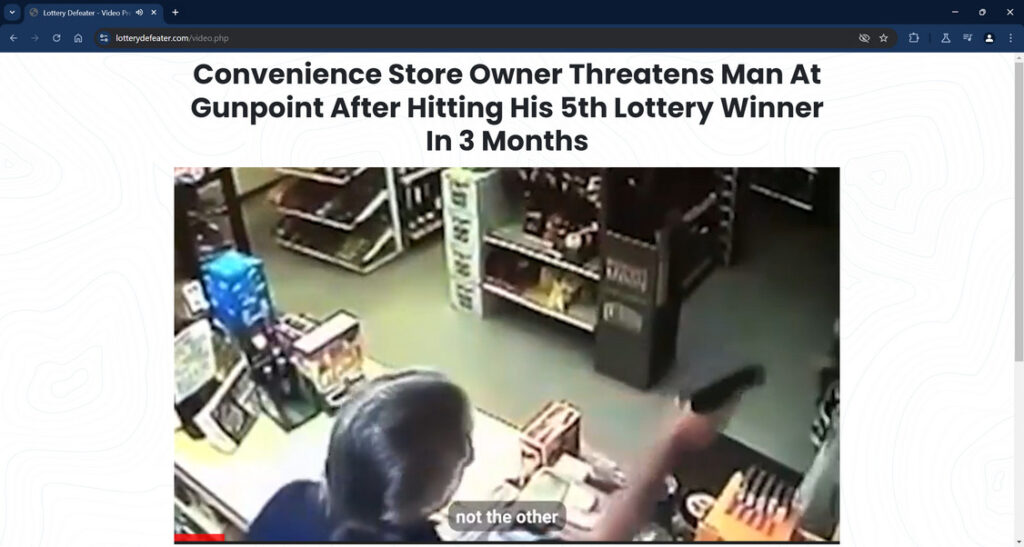The promise of winning millions in the lottery is an alluring prospect that captures the imagination of countless individuals. However, scammers are well aware of this appeal and have devised devious schemes to exploit those dreams for easy profits. One such scam, the Lottery Defeated Membership, has been defrauding hopeful individuals for years through false claims and misleading testimonials.

Scam Overview
The Lottery Defeated Membership, also known at times as Lottery Defeater, is an online scam promising a secret method to boost lottery winnings. Using a fabricated spokesperson named Kenneth Leffer, the scammers behind this scheme create elaborate backstories of repeat lottery wins to hook unsuspecting customers.

This membership package, which costs $197 initially, promises to provide “tweaks” to lottery number selection informed by advanced probability concepts. However, the reality behind the smokescreen is that no legitimate winning system exists. The scammers bank on desperate individuals overlooking the illogical claims in favor of the tantalizing possibility of guaranteed winnings.
This deceptive membership scheme operates through clickbait YouTube videos and fake review websites. Potential victims are lured in by stories of easy wins only to be met with high-pressure sales tactics pushing overpriced guides filled with bogus information. Any “wins” reported by customers are fabrications intended to perpetuate the illusion.
The scammers rake in substantial profits from each victim while providing nothing of actual value in return.
This scam has been also investigated by Jordan Liles on his YouTube channel, where he offers a detailed video on the subject. We recommend watching his content for a comprehensive understanding of the scam.
Next, let’s break down exactly how scammers carry out this scam from start to finish.
How the Lottery Defeated Membership Scam Works
The Lottery Defeated scheme employs a multi-pronged approach to reel in victims. Here is an overview of the step-by-step process used by these scammers:
Step 1: Create Clickbait YouTube Videos
The scammers first hook potential victims through YouTube ads and videos with exaggerated headlines like “Retired Janitor Wins Lotto Jackpot Using This Simple Trick.” These videos feature paid actors portraying characters like “Kenneth Leffer” who claim to have discovered a secret lottery winning system. Despite completely illogical claims, the presentation style is intended to entice viewers desperate for a solution.
Step 2: Direct Viewers to Deceptive Sales Pages
Once viewers are invested in the story, the YouTube videos direct them to elaborate sales pages on websites like “wellbeing-insider.com.” These pages continue the fabricated story using false testimonials and cherry-picked lottery data to make it seem plausible. Authoritative sounding language discusses complex mathematical lottery analysis that doesn’t actually exist.

Step 3: Offer the Membership deal
After priming victims to believe a winning system exists, the sales page offers the Lottery Defeated Membership for $197. Limited time discounts and free bonus offers create high-pressure purchase conditions. Fake customer reviews and satisfaction guarantees aim to overcome lingering doubts.
Step 4: Deliver Worthless Information
Despite lofty promises of a winning system, the purchased membership only provides a generic guide filled with useless probability basics and basic lottery advice. However, slick production quality helps maintain the illusion of value. Any mild success stories are attributed to the system to keep victims hooked.
Step 5: Upsell Useless Add-Ons
Members who ask about improving win rates are steered toward increasingly expensive upsells. These include things like accelerated number picking, analysis software, and VIP coaching packages costing hundreds more. Each new add-on promises to boost wins while only deepening the charade.
This cycle continues as long as victims remain convinced bigger investments will pay off. However, the promised wins never materialize since no actual winning system exists. The scammers repeatedly exploit this desperation until the victim ultimately realizes the false promises or can no longer afford to keep spending.
Warning Signs You May Be Dealing With the Lottery Defeated Scam:
Here are some key indicators that a lottery system offer is actually the deceptive Lottery Defeated Membership scam:
- Claims of unlikely repeat wins from a secret system
- Too good to be true promises of guaranteed better odds
- High-pressure sales tactics like one-time offers
- Emphasis on personal stories over verifiable facts
- Details on system kept hidden until after purchase
- Only generic basic advice provided after purchase
- Ongoing upsell offers for increasingly expensive add-ons
- Lack of legitimate customer reviews and feedback
Any offer matching several criteria on this list is almost certainly a version of the Lottery Defeated scam. Remember, if something sounds too good to be true, it almost always is. Legitimate lottery winning systems simply do not exist.
What to Do if You Already Fell Victim to This Scam:
If you already purchased the Lottery Defeated membership or related upsells, don’t panic. Here are the steps to take to minimize further losses:
1. Immediately Stop Paying For Anything Further
End the cycle by cutting off all payments or recurring billings associated with the program. Ignore any demands for more payments with the promise it will eventually pay off. The system is a scam, so no additional money should be paid.
2. Call Your Bank or Credit Card Company
Notify your bank or credit card provider that you believe you fell victim to a scam membership program. Ask them to halt any pending charges. Also request to charge-back any recent payments if possible to recover lost funds.
3. Gather All Relevant Documentation
Collect any receipts, promotional material, correspondence with the scammers, etc. This evidence will bolster your fraud claim during chargeback disputes. The more documentation you have, the better.
4. File Complaints With Relevant Authorities
To help shut down the scam, file formal complaints with the FTC, state attorneys general, and BBB. Also submit abuse reports to any online platforms hosting the deceptive promotions like YouTube.
5. Warn Others Online
Post warnings about the scam on consumer complaint sites to prevent others from falling victim too. Share your experience on scam reporting sites like RipoffReport.com.
6. Let It Be A Costly Lesson
While losing money to scammers is infuriating, treat it as a life lesson moving forward. Be wary of get rich quick schemes and high-profit claims based on personal stories rather than facts. Let your experience protect you and others in the future.
Frequently Asked Questions About the Lottery Defeated Scam
1. What is the Lottery Defeated scam?
The Lottery Defeated scam is a deceptive online scheme that promises a secret system to help people win the lottery. Using false claims of repeat wins and doctored success stories, scammers sell overpriced guides with useless information. They exploit desperate individuals with dreams of guaranteed lottery riches.
2. How does the Lottery Defeated scam work?
The scammers use clickbait YouTube ads and fabricated testimonial videos to drive traffic to high-pressure sales pages. There they convince victims to purchase a worthless guide for $197. Ongoing upsells for “advanced” techniques keep the scam profits flowing.
3. What techniques does the Lottery Defeated scam use?
Tactics include fake wins stories, limited-time discounts, money-back guarantees, and bait-and-switch bonuses. Peer pressure from false reviews adds legitimacy. Communication stays vague to avoid scrutiny until after purchase.
4. What do victims of the scam receive?
Despite promises of a winning system, victims only receive a basic guide filled with useless probability information and generic lottery tips. It contains nothing unique and has no special insights.
5. How much does the Lottery Defeated scam cost?
The initial membership fee is $197 but additional upsells cost hundreds more. Members are pressured to keep buying until they realize it’s a scam or can no longer afford to pay more.
6. Are there any real winning lottery systems?
No. Claims of guaranteed wins or odds-beating systems are always scams. Legitimate lottery winning systems do not exist. Mathematically beating randomized numbers is impossible.
7. How can I avoid lottery scams like this?
Use logic over emotions. Research suspicious claims. Beware of too good to be true stories. Never pay for “secret” systems based solely on personal testimonials. Trust facts over feelings.
8. What if I already paid for Lottery Defeated?
Immediately cease payments. Call banks to halt charges. File complaints and chargebacks to recover losses if possible. Warn others online about the scam.
9. Are there legal consequences for the Lottery Defeated scammers?
Authorities are working to penalize false advertising, fraud, and exploitation related to these scams. But scam operations evade detection by shutting down and rebranding.
10. How can I spot similar lottery scams?
Warning signs include unlikely repeat wins claims, hiding details until after purchase, too good to be true promises, high-pressure sales tactics, and lack of verifiable evidence.
The Bottom Line: Avoid the Lottery Defeated Scam
The bottom line is that the Lottery Defeated Membership and its many iterations remain an active scam stealing money from unsuspecting dreamers. No “secret system” can improve your odds or guarantee lottery wins despite the convincing façade perpetuated by these scammers.
Do not believe any stories of easy, repeat wins through questionable systems. All evidence indicates the Lottery Defeated program offers nothing beyond basic probability information at best. Don’t fall for the false promises designed to hook the desperate and gullible.
Stay vigilant against increasingly elaborate lottery scams like this by following smart consumer practices. Rely on logic over emotions, scrutinize bold claims, research suspicious offers, and be wary of too good to be true opportunities. Avoiding obvious frauds like the Lottery Defeated Membership can save you a great deal of money as well as frustration.



